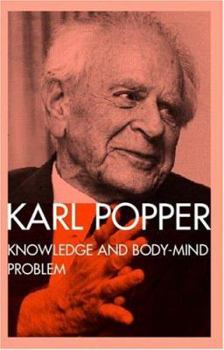Knowledge and the Body-Mind Problem: In Defence of Interaction
Select Format
Select Condition 
Book Overview
Based upon the Kenan Lectures that Karl Popper delivered at Emory University in 1969, Knowledge and the Body-Mind Problem raises problems connected with human freedom, creativity, rationality, and the relationship between human beings and their actions. These are what Popper calls big issues - too big for easy answers, but too important to be ignored. In these lectures, and in the discussions that follow them, Sir Karl develops a theory of body-mind interaction. This theory involves evolutionary emergence, human language, and that realm of autonomous products of the human mind which Popper calls World 3. According to Popper, consciousness emerged in the course of evolution as a kind of control system for the body, like a driver is a control system for a car. Objective knowledge - the kind of knowledge that is found in books and libraries - then emerged in the course of evolution as a higher level control system for the mind. Simply put, objective knowledge is the mind's control system for critical problem solving. In this way, full consciousness - the kind of consciousness that humans can have - is anchored in World 3 and is closely linked to human language, problems, theories, and criticism. And it is mainly through this use of objective knowledge as a control system for critical problem solving that we are able to exercise our freedom, creativity, and rationality - first by making contributions, like science books and works of art, to World 3; and then by using these contributions to bring about changes in Worlds 1 and 2. The Kenan Lectures were well-attended and provoked lively discussions. This book is published in the same informal language in which they were originally delivered and so can be easily understood by a general audience.
Format:Paperback
Language:English
ISBN:0415135567
ISBN13:9780415135566
Release Date:December 1995
Publisher:Routledge
Length:168 Pages
Weight:0.90 lbs.
Dimensions:0.5" x 5.5" x 8.4"
Age Range:18 years and up
Grade Range:Postsecondary
Customer Reviews
2 ratings
Even the most rational men are in many respects highly irrational
Published by Thriftbooks.com User , 15 years ago
This very revealing book exposes Popper's vision on man, science, philosophy and his (wrong) solution of the body-mind problem. For Popper, there are three different worlds: a physical one, a spiritual one and an objective one (autonomous products of the human mind, like books or mathematics.) Body-mind problem Popper is a dualist, a body/mind man. But, like Descartes, he was confronted with the problem of the interaction between physical and mental states. For Descartes, this interaction took place in the pineal gland; for Popper, in the speech centre of the brain. Hereupon, W. Van Orman Quine asked pertinently: `Why introduce man's mind, since it is simpler and more convenient to say that only physical things and states exist? The bodily states are there anyway, why add the others?' Popper rejected fiercely physicalism. Rationality Popper doesn't assert that man is rational. On the contrary, it is obvious for him that even the most rational of men are in many respects highly irrational. Rationality is simply a critical attitude towards problems, the readiness to learn from our mistakes. Comments on other philosophers For Berkeley, the world doesn't exist except in our minds. The material world is a kind of a dream (?). For Wittgenstein, truth is a picture. A statement is true if it is a true picture of the facts. But (for Popper) a statement is only in a metaphorical sense a picture. For M. Schlick, correspondence with the facts (=truth) is a kind of mathematical one-to-one correspondence. But (for Popper) to one fact may correspond many true descriptions. Phenomenology tries to interpret physical things as bundles of sense data (phenomena). In other words, it tries to reduce physical things to mind. This book is a must read for all those who are interested in what really exists in the real world we live in.
indispensible text on epistemology and interactionism
Published by Thriftbooks.com User , 27 years ago
Popper creates an original (and useful) theoretical framework to interpret the interaction of mind and body- the world3 model. Although parts seem uninformed by advances in neurology and cognitive science, the framework itself is useful in explaining the relationship between the physical world (world1), the cognitive world (world2), and the products of the mind that exist as a result of human invention (world3). As always, Popper provides a series of compelling arguments that at the very least establish a threshold of reason that must be crossed for the serious student of epistemology.






